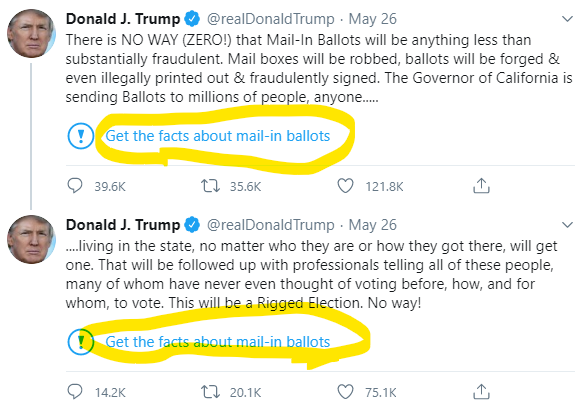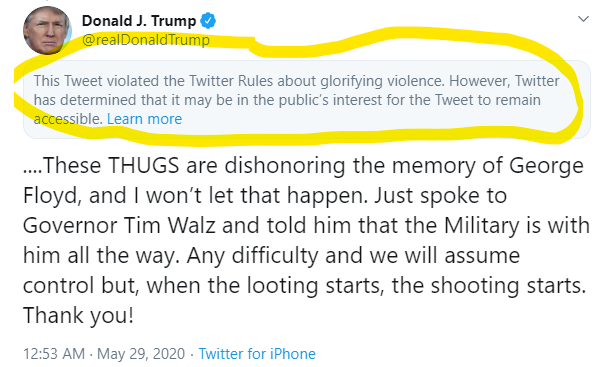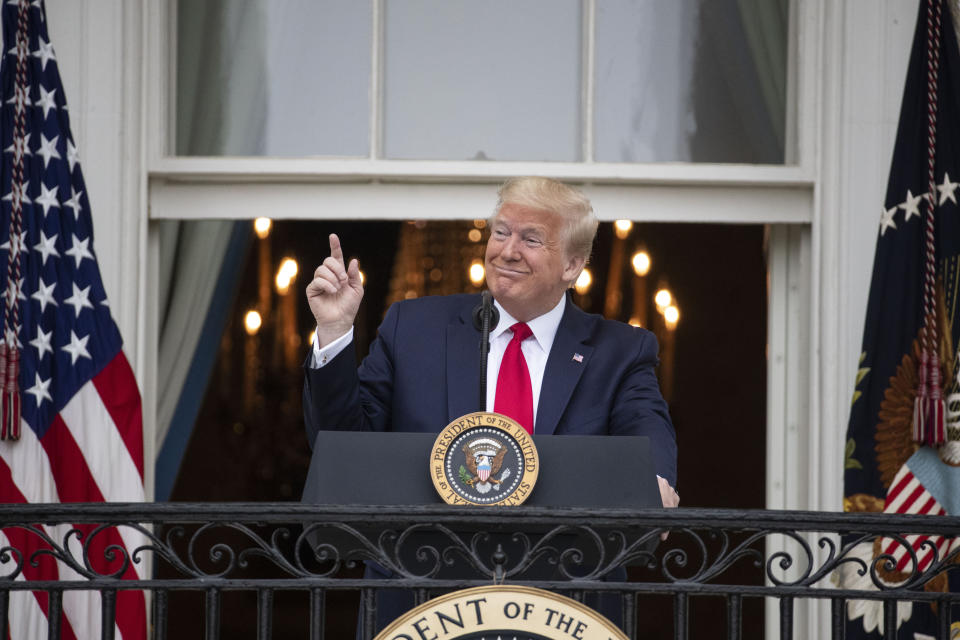Why Trump will relish a war with Twitter
President Trump has a fresh feud, this time with Twitter (TWTR), the social media platform he uses to attack enemies, spread propaganda and brag. Twitter has taken some audacious steps. It labeled two Trump tweets as factually suspicious, with a blue link at the bottom urging readers to “get the facts” about mail-in voting, because Trump’s claims were bogus. It tagged another Trump tweet with a message saying it violated Twitter’s policies by “glorifying violence.” Twitter has obviously made a major strategic decision to begin policing Trump’s provocations and misstatements on the platform.
You’d be disappointed if Trump were anything less than outraged by Twitter’s action. Twitter, he now says, is interfering in the 2020 election and stifling free speech—claims Twitter should have labeled as bogus, too. Trump signed a new executive order meant to limit certain legal protections Twitter and other online businesses enjoy. It will face an immediate legal challenge and might never go into effect. But that’s beside the point.
What’s going on here is exactly what Trump wants: A fake scandal metastasizing into yet another opportunity for Trump to indulge his persecution complex and portray himself as the victim of Deep Media. Who knows if it will help him get reelected, but Trump wants to distract Americans from the awful coronavirus death toll, which recently topped 100,000, and a deep recession that has put 41 million Americans out of work. A war with Twitter is right out of the Trump playbook.

The trigger for Twitter’s action is a shameful Trump smear addressed at MSNBC host Joe Scarborough, a vigorous Trump critic. In 2001, when Scarborough was a member of Congress, a 28-year-old aide died in his Florida office in a tragic accident, apparently passing out from an undiagnosed medical condition and hitting her head on a piece of furniture. Trump claims it’s a “cold case” in which Scarborough is a suspect, which is completely false. The aide’s widowed husband has asked Trump to desist, because it’s cruel to surviving family members. Trump has ignored the request and continued with the attacks, prompting calls for Twitter to suspend his account or take some other action.
Trump’s bogeyman strategy
So Twitter labeled two Trump lies with the blue exclamation point, focusing not on Trump’s heartless attacks on the deceased aide but on election integrity. Better than nothing? Maybe. But it plays right into Trump’s strategy. Here’s how this is likely to unfold.
A 1996 law gives Twitter and other online networks broad discretion in terms of how they treat content posted by users. Trump wants to tighten the law to his advantage and find a way to punish networks that control content in ways disadvantageous to conservatives. That’s blatantly political and it would require Congress to pass a new law, which isn’t going to happen any time soon, because Democrats control the House. This is why Trump’s order probably has no chance in court.

Trump has no authority to shut down Twitter, which is a publicly held company—and he’d be crazy to shut it down if he could. Trump has 80 million Twitter followers, and the platform is his best tool for sidestepping traditional media. He needs Twitter, and wouldn’t be Trump without it. No other platform foments outrage as effectively as Twitter’s short-form, rapid-fire posts, and that outrage is Trump’s lifeblood as a politician.
Trump will still thrash Twitter, however, because it’s a useful whipping boy for him. Three months ago, Trump’s reelection strategy was to run on a strong economy. With a ravaging recession underway, Trump can’t do that anymore. He has also earned poor marks for his handling of the coronavirus pandemic. He has little interest in the details of leading during a crisis, deferring to Vice President Mike Pence and various governors. As a politician, Trump is floundering, and his future in public life is looking short.

So Trump needs villains, bogeymen and enemies to distract voters from the problems he can’t fix and make them think only he can protect them from imminent threats. He used the bogeyman strategy in 2016, when a central theme of his campaign was rolling back immigration. He’s demonizing China now as a way of deflecting blame for his dismissive response to the coronavirus, hoping American voters will blame foreign spreaders of the virus and forget about his notoriously slow response to the threat.
Twitter fits neatly onto Trump’s enemies list. He has already accused tech platforms such as Facebook (FB), Twitter and YouTube of discriminating against conservatives (get the facts). Twitter is practically giving him fresh ammunition. Twitter CEO Jack Dorsey is smart, and he probably gamed out multiple scenarios for what could happen if Trump declared war on his company.
The worst case is probably a lot of verbal abuse Trump and his allies will hurl at Twitter that won’t harm Twitter’s business prospects at all. It’s notable that Trump’s threatened retribution against Twitter came in a tweet. Millions of Trump supporters are rallying around Trump—on Twitter. Some discrimination.
If Trump really wanted to hurt Twitter, he’d sign off, encourage his followers to do the same, and decamp to a competing platform, preferably one with a conservative mindset, like the Breitbart news site. But there is no such platform, and Twitter has scale on its side. Trump craves attention, good or bad, and no other platform can deliver the audience or immediate reaction Twitter can.
Facebook has the scale, but it’s too broad for Trump to get the immediate, concentrated response he does on Twitter. Instagram is for lifestyle gurus and celebrities, not smash-mouth politicians. Snapchat (SNAP) is too narrowly focused. TikTok is for kids, not angry old men. YouTube videos require too much effort. For Trump’s purposes, Twitter is a monopoly, and he can’t leave.
Besides, Twitter has some good company on Trump’s enemies list, including Amazon (AMZN), CNN’s parent company AT&T (T) , General Motors (GM), the NFL and most media organizations. They’ve all survived. Twitter will too.
A version of this article was originally published on Wednesday, March 27, 2020.
Rick Newman is the author of four books, including “Rebounders: How Winners Pivot from Setback to Success.” Follow him on Twitter: @rickjnewman. Confidential tip line: [email protected]. Encrypted communication available. Click here to get Rick’s stories by email.
Read more:
Get the latest financial and business news from Yahoo Finance
Follow Yahoo Finance on Twitter, Facebook, Instagram, Flipboard, SmartNews, LinkedIn, YouTube, and reddit.
